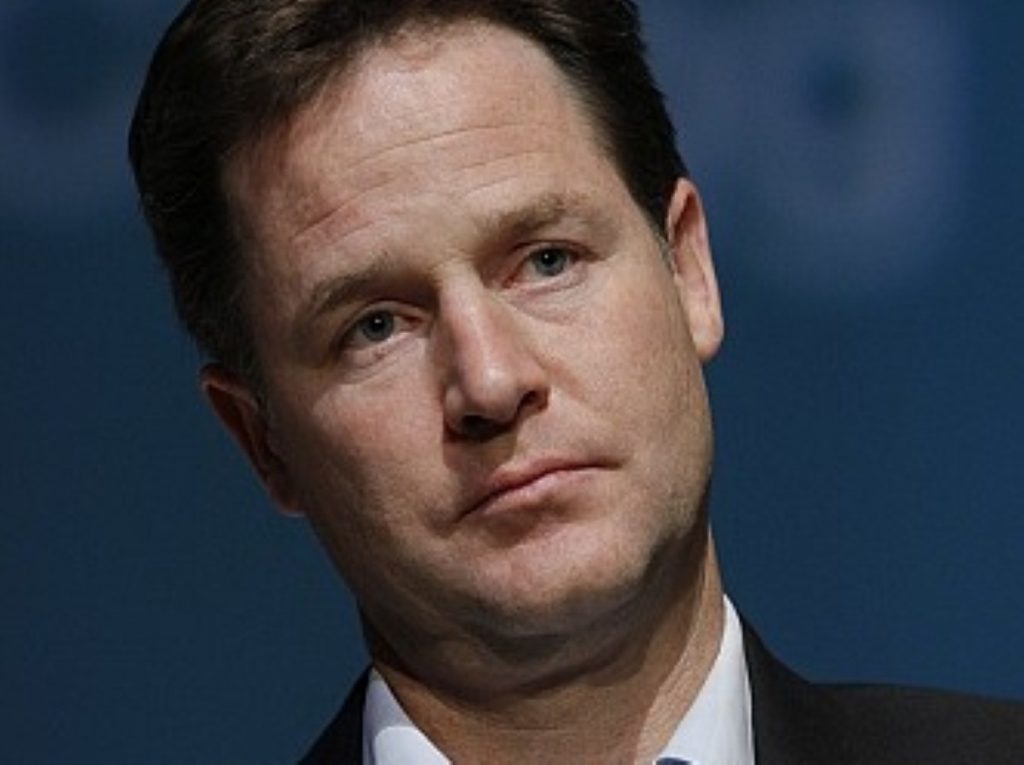Even after everything, Lib Dems still love Nick Clegg
One wonders what Nick Clegg would have to do to make the Lib Dems hate him. Sleep with their other halves? Scar their children? After all, he's tarnished their political values, reduced them to parliamentary rubble and turned their political aspirations into a dinner party joke. But still they packed the halls at the Bournemouth conference centre for him. They rose as one for a standing ovation as soon as he entered and again for a more prolonged one as he left.
"Wonderful man," a woman on the end of my row of seats said as I passed her. "Wonderful man." As I left the hall, an elderly woman said to her husband: "I'm glad it was so full. He deserved that."
To be fair to him, it was actually a very good speech, not because of its formulation but for how perfectly it encapsulated the state of the speaker and his audience. Both Clegg and the people in the hall are picking up the pieces, trying to figure out what, if anything, went right, and what went wrong. It was the political equivalent of that dreadful sense of shame after a drunken night out.
There was an element of mea-culpa in there. Clegg admitted to his own "mistakes and miscalculations" while deputy prime minister, although he did not really flesh out what they were, with one exception. He admitted the 'head and heart' rhetoric about the centre ground during the election suggested their position was tactical rather than principled. But even then he quickly added that there were no other strategic avenues he could have taken.


Mostly, he appeared to blame the voters, in a manner which is not so different to the way many accuse Labour of doing in the wake of their own election defeat.

Happier times. Nick Clegg's list of coalition achievements fails to impress
Clegg told a story of walking down a high street the day after the election and having people come up to him and express their frustration with the unfairness of the result, only to then admit they voted Green. He called it "buyers' remorse". The implication is that they now realise how naughty and foolish they were not to vote Lib Dem.
He called George Osborne and David Cameron "lucky generals" who benefitted from Gordon Brown supposedly crashing the economy and the Lib Dems supposedly copping all the blame for spending cuts.
But when it came to his own assessment of his achievements in office, he seemed unaffected by how paltry it was. There was a line about mental health and another on gay marriage. For five years work, it seemed unimpressive. But that fact and the failure of voters to back the party, did not appear to have been connected in his mind.
There was nothing, of course, about supporting the attacks on judicial review or defending the prisoner book ban. And certainly nothing about the market-driven NHS reforms or swingeing cuts to welfare to which he gave the nod. Instead, he attacked the Tories for cutting tax credits.
What goes for Clegg goes for the Lib Dems in general. Most of them are almost gleeful in their desire for everyone to see 'what the Tories are like now we're not there to control them'. The idea they may have controlled them insufficiently does not seem to have occurred to them. Nor do many question the battles they chose to fight or the manner they chose to fight them.

Farewell speech? Clegg has left his parliamentary party much reduced
Clegg ended the speech with a rousing section insisting that there is still a place in Britain for "tolerance, reason and compassion". If by that he meant the Liberal Democrats then he is surely correct. There is still demand for the proposition Clegg put inelegantly at the election, of kind but competent government. Basically, the same thing Tony Blair was promising in 1997. And the crowds squeezed into the hall suggested that after the election, many people realised it about themselves and signed up to join the party.
There is a sense that this new membership surge is making the party complacent. A party which really intended to get back into contention would be experiencing more of an existential crisis than the one on evidence in Bournemouth. But that is not the Lib Dem way. Whenever journalists predict they're about to fall apart, they trundle amiably on. In May they trundled amiably towards a decimated parliamentary party. The next time it could be towards extinction.
Clegg dedicated a section of his speech to celebrating the way he had been replaced. He praised the "respectful and thoughtful" contest between Tim Farron and Norman Lamb and compared it to the shrill brutality of the Labour contest. But in truth, it might have been good for the party if it had been a little more brutal. As Clegg rightly states, the demand for the Lib Dems is there. But there is too little thought about what went wrong in coalition and how it might be put right next time. The blame is still mostly being heaped on the public rather than the party itself.

